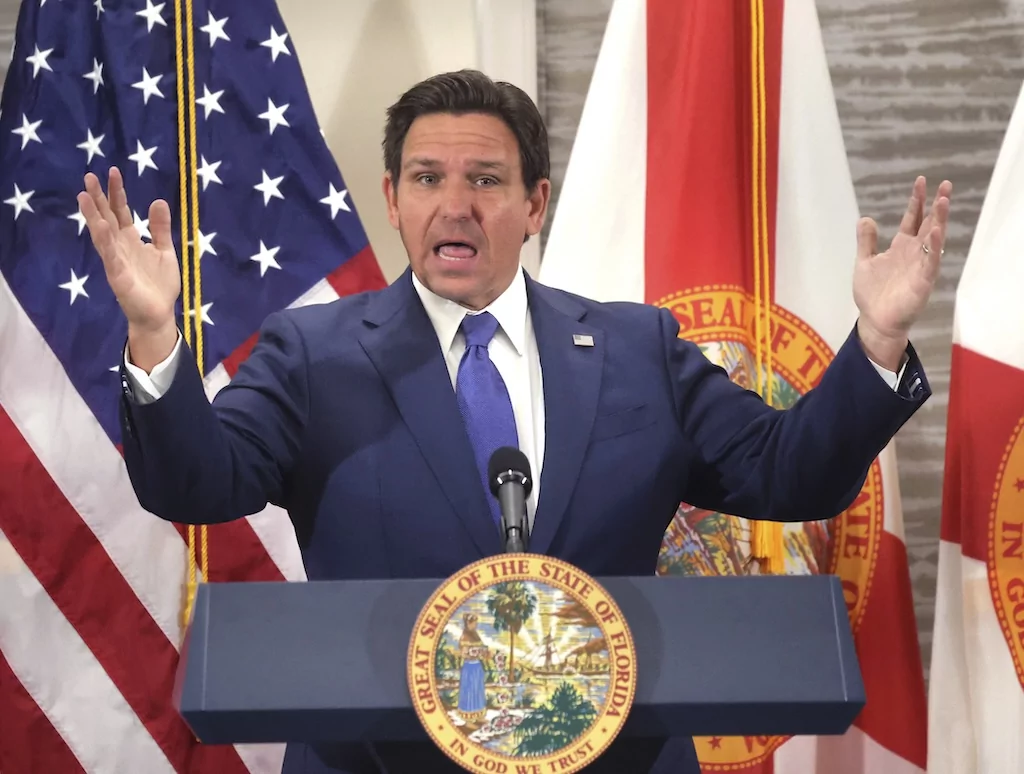


Gov. Ron DeSantis (R-FL) is seeking to use Florida’s Department of Government Efficiency to further his goal of cutting property taxes after the state legislature failed to do so earlier this year.
The Florida legislature in June declined to include DeSantis’s proposal to cut $5 billion in property taxes and hand Floridian homeowners each $1,000 in savings, in the state’s $115 billion 2025-26 budget. The final budget came after the governor engaged in a monthslong feud with Republican Florida House Speaker Daniel Perez over whether to prioritize cutting property or sales taxes.
Recommended Stories
- Eggs, groceries, gas, housing: What’s happened with key prices under Trump
- Inflation held at 2.7% in July, allaying tariff fears
- Nvidia and AMD to pay 15% of sales to China to US
However, on Monday, Florida chief financial officer Blaise Ingoglia, who oversees the state’s DOGE, reiterated hopes that the bureaucracy-slashing task force can help accomplish the governor’s effort to cut property taxes. Ingoglia’s comments this week came as he launched a DOGE audit into Hillsborough County, which includes Tampa, one of Florida’s largest cities, as part of a statewide effort to uncover “waste, fraud, and abuse” and bring down property taxes.
“This is all as a precursor and a pretext to reducing property taxes,” Ingoglia said. “Here in the state of Florida, property taxes have skyrocketed over the past five years… between 60 to 120%.”
Ingoglia’s remarks come as DeSantis has said the audits will set the stage for property tax reform on the 2026 ballot, when voters will decide whether to approve a constitutional amendment seeking to abolish property taxes altogether. The audits are meant to show that these local governments can reduce spending and absorb any property tax reduction, the governor has suggested, amid concerns from Perez that slashing the taxes could cripple local governments’ ability to cover certain public services.
“I really believe you can do the things at the local level we all agree on—education, first responders, all that—and still be able to provide meaningful property tax relief, but not if the spending is not kept in check on these other items,” DeSantis said turing a press conference alongside Ingoglia in July as the pair announced DOGE audits of the city of Gainesville and Broward County.
“It’s one thing for the state of Florida to do what we’ve done, and we’re proud of that,” the governor continued. “But if you’re a Floridian, whether it’s city or county government, taxpayers should be put first. Taxpayers should be respected.”
Ingoglia has launched audits into multiple municipalities across Florida since DeSantis announced Florida’s DOGE task force in February. At the time, the governor said the task force would review the state’s education system, along with state and local government.
In March, DeSantis specifically identified local property taxes as a potential area where DOGE could scrutinize taxes for reductions, warning senior citizens were being “pinched” by the annual tax on their properties as values increased.
“Now they’re being told it’s worth so much more, and they have to pony up more and more money. It’s almost like they have to pay rent to the government just to be able to enjoy their property, and that’s wrong,” the governor said.
On Monday, Orlando, one of the cities currently undergoing review, handed over 27,000 documents to the Florida DOGE. The city’s $9 billion budget, specifically, finances related to its property taxes, are likewise audited by the state.
“We have a lot of work to do with the counties. We have a lot of work to do with the cities. But what I can tell you is that I’m not going away,” Ingoglia said at a news conference that day. “Cities and counties should not be mistaken that this is a short-term thing. This is a long-term thing.”
“We are finding pretty egregious examples of waste, fraud, and abuse,” he continued. “I believe that if taxpayers fully understood what local governments are spending their money on, they would have an issue with it.”

FLORIDA LAWMAKERS PASS $115 BILLION BUDGET LEAVING OUT KEY PRIORITIES AFTER DESANTIS-PEREZ FEUD
Orlando turned over the files after Ingoglia sent a letter to city officials expressing concern that property tax collections had surged 55% since 2020, even as the city’s property tax rate has remained stagnant.
“Although Orlando has kept its millage rates constant in recent years, rising property values pushed budgeted annual property tax collections up by over $120 million between 2020 and 2025 — a 55% increase,” the letter reads. “This growing burden on property owners significantly outpaces inflation and the growth in population reported in your budget over that time period.”
